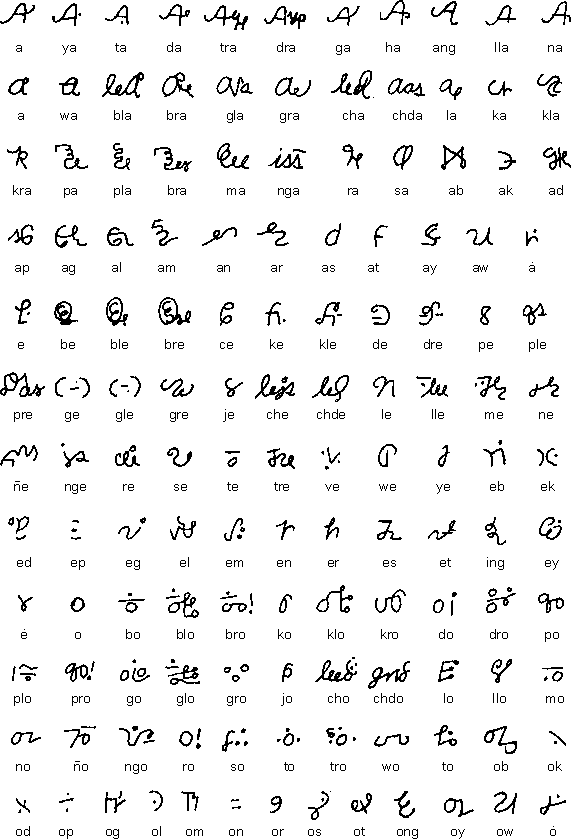Eskayan is a language isolate spoken on the Philippine island of Bohol. The exact number of speakers is uncertain and while the language is unrelated to any other, it does share syntactic and morphological features with Boholano-Bisayan, the main language of Bohol, and there are also Spanish influences. The Eskayan people speak Cebuano as their everyday language and use Eskayan for prayers, songs and formal speeches.
Eskayan is written with a syllabic script consisting of over 1,000 symbols, some of which are shown below. The symbols are apparently modelled on human body parts, though resemble cursive Latin letters. The earliest known written document in Eskayan dates from 1908. Apparently a man named Pinay invented the script, though nobody knows when he did so.
A method of writing Eskayan with the Latin alphabet is also used in schools. It is not completely standardised.


Samnat yo bantelar,
Datong con Bathala,
Ya abeya cloper meboy secwes
Nemte ya chdid loning
Ya moy beresa gui
Samnat eclabolto
Gona yonoy dokerkedo
Bentod ya hondog yel moy sebar
Chda a chdiam yel keman pay
Edlac esto mesesabla
Lo-ya bac Lobor,
Chdire esto ebetangke chda loreker
Parong esto topete
Ya droser, ya secwes
Do-o moy sam
Tewergoyo asado chda carna
Ya lacyo booy.
This is the land I love,
The land God gave to me,
Caressed by the sun, Bathed by the sea,
And kissed by the cool breeze
Night and day.
Here's where the early heroes lived,
Here's where they wrought peace and here they bled,
Here rise the marvelous cone-shaped hills,
Here's sweet kinampay grows.
Blessed with white sandy beaches,
Rivers that water valleys,
Seas teem with fishes and cows graze on the plains,
In ev'ry home love reigns,
God keep my homeland always free,
Let her forever be,
I pledge my strength, my heart and soul,
To my dear home, Bohol.
Source: http://www.ling.hawaii.edu/ldtc/languages/eskaya/Translation%202.html
Information about Eskayan | Numbers in Eskayan
Information about Eskayan
http://en.wikipedia.org/wiki/Eskayan_language
https://bravenewwords.info/tag/eskaya-script/
https://www.tandfonline.com/doi/abs/10.1080/07268602.2016.1109433?journalCode=cajl20
Adaizan, Ainu, Basque, Burushaski, Candoshi-Shapra, Chitimacha, Eskayan, Hadza, Haida, Karuk, Kawésqar, Keres, Kuot, Kusunda, Kutenai, Natchez, Nihali, Nivkh, Páez, Purepecha, Sandawe, Seri, Sumerian, Tartessian, Ticuna, Tiwi, Tonkawa, Tunica, Urarina, Waorani, Warao, Wardaman, Washo, Yaghan, Yele, Yuchi/Euchee, Zuni
Afaka, Bamum, Caroline Island Script, Celtiberian, Cherokee, Cypriot, Dunging (Iban), Eskayan, Hiragana, Iberian, Katakana, Kpelle, Loma, Mende (Kikakui), Mwangwego, Nüshu, Nwagụ Aneke, Vai, Yi, Yugtun
Page last modified: 07.02.24
[top]
You can support this site by Buying Me A Coffee, and if you like what you see on this page, you can use the buttons below to share it with people you know.

If you like this site and find it useful, you can support it by making a donation via PayPal or Patreon, or by contributing in other ways. Omniglot is how I make my living.
Note: all links on this site to Amazon.com, Amazon.co.uk
and Amazon.fr
are affiliate links. This means I earn a commission if you click on any of them and buy something. So by clicking on these links you can help to support this site.
[top]